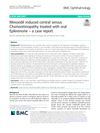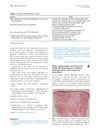 December 2024 in “Asian Journal of Pharmaceutical and Clinical Research”
December 2024 in “Asian Journal of Pharmaceutical and Clinical Research” Combining synthetic and herbal treatments may help with hair loss, but more research is needed.
 July 2023 in “Research Square (Research Square)”
July 2023 in “Research Square (Research Square)” Two patients got Cushing's syndrome after treatment with Triamcinolone Acetonide for mouth fibrosis, but recovered after stopping the treatment.
 August 2018 in “Journal of The American Academy of Dermatology”
August 2018 in “Journal of The American Academy of Dermatology” Oral alitretinoin is effective for certain types of chronic hand eczema, with mild side effects.
 November 2009 in “Cambridge University Press eBooks”
November 2009 in “Cambridge University Press eBooks” Minoxidil and finasteride combined can effectively treat hair loss.
 July 2008 in “British Journal of Dermatology”
July 2008 in “British Journal of Dermatology” Cyclosporin doesn't stop hair loss.
 159 citations,
March 2014 in “Journal of The American Academy of Dermatology”
159 citations,
March 2014 in “Journal of The American Academy of Dermatology” Some skin medications are safe during pregnancy and breastfeeding, but others can harm the baby and should be avoided.
 77 citations,
June 2015 in “Nature Reviews Urology”
77 citations,
June 2015 in “Nature Reviews Urology” Some common medications can harm male fertility, but many effects can be reversed.
 18 citations,
October 2018 in “Journal of The American Academy of Dermatology”
18 citations,
October 2018 in “Journal of The American Academy of Dermatology” Some skin medications can harm male fertility, but they don't seem to cause birth defects from father's exposure.
 16 citations,
April 2014 in “Expert Opinion on Pharmacotherapy”
16 citations,
April 2014 in “Expert Opinion on Pharmacotherapy” Teriflunomide is an effective and safe first-line oral treatment for relapsing multiple sclerosis.
 7 citations,
September 2013 in “Current Dermatology Reports”
7 citations,
September 2013 in “Current Dermatology Reports” Some skin medications are safe for pregnant women, but others pose risks or should not be used.
 6 citations,
November 2010 in “International Journal of Andrology”
6 citations,
November 2010 in “International Journal of Andrology” New oral testosterone formulations show potential for safer, effective hormone replacement in men with low testosterone.
 January 2016 in “Springer eBooks”
January 2016 in “Springer eBooks” Understanding drug interactions, side effects, and patient-specific factors is crucial for effective dermatological care.
 14 citations,
August 2020 in “Dermatologic Therapy”
14 citations,
August 2020 in “Dermatologic Therapy” Low-dose oral minoxidil is a safe treatment for hair loss, with the main side effect being excessive hair growth. Other side effects like foot swelling, low blood pressure when standing, and heart rate changes are rare.
 14 citations,
April 2017 in “American Journal of Transplantation”
14 citations,
April 2017 in “American Journal of Transplantation” Skin problems from transplant drugs are common and need careful management in organ transplant patients.
 13 citations,
February 2018 in “Dermatologic Therapy”
13 citations,
February 2018 in “Dermatologic Therapy” Finasteride 2.5 mg/day can effectively treat female hair loss.
 8 citations,
December 2020 in “Skin appendage disorders”
8 citations,
December 2020 in “Skin appendage disorders” Low-dose oral minoxidil helped regrow eyebrows in women with Frontal Fibrosing Alopecia.
 23 citations,
September 2016 in “BMC musculoskeletal disorders”
23 citations,
September 2016 in “BMC musculoskeletal disorders” Methotrexate for rheumatoid arthritis often causes side effects like diarrhea, fatigue, and hair loss, especially at higher doses.
 4 citations,
June 2020 in “BMC Ophthalmology”
4 citations,
June 2020 in “BMC Ophthalmology” Minoxidil can cause a rare eye condition, but it was successfully treated with oral Eplerenone in one case.
 June 2018 in “Journal of Clinical Periodontology”
June 2018 in “Journal of Clinical Periodontology” Finasteride may cause gum problems, but stopping the drug can improve these issues.
 83 citations,
April 1992 in “Clinical Endocrinology”
83 citations,
April 1992 in “Clinical Endocrinology” Having enough iron improves the effectiveness of a specific hair loss treatment in women.
 30 citations,
March 2001 in “Archives of Dermatology”
30 citations,
March 2001 in “Archives of Dermatology” Finasteride can cause one-sided breast enlargement, which disappears after stopping the drug.
 19 citations,
October 2012 in “Frontiers of Hormone Research”
19 citations,
October 2012 in “Frontiers of Hormone Research” Lifestyle changes are the first step in treating infertility in PCOS, followed by medications like clomiphene and metformin, and then surgery if needed.
 4 citations,
April 2020 in “JAAD case reports”
4 citations,
April 2020 in “JAAD case reports” JAK inhibitors help hair regrowth but not fully effective for androgenetic alopecia.
 14 citations,
October 2020 in “Natural Products and Bioprospecting”
14 citations,
October 2020 in “Natural Products and Bioprospecting” Various treatments, including FDA-approved drugs, natural products, and oral supplements, can help with hair loss, but a patient's medical history and potential allergies should be considered when choosing a treatment.
 May 2011 in “Value in Health”
May 2011 in “Value in Health” CP-690,550 significantly reduced itching in patients with moderate-to-severe plaque psoriasis.
 October 2023 in “Cognizance journal”
October 2023 in “Cognizance journal” The document suggests using natural remedies like bloodletting and honey for various health issues but lacks scientific evidence for their effectiveness.
83 citations,
December 2012 in “International journal of endocrinology and metabolism/International journal of endocrinology and metabolism.” Oral contraceptives provide various health benefits beyond birth control, including managing menstrual issues, skin conditions, pain, and reducing the risk of certain cancers.
 32 citations,
September 2017 in “Journal of the American Academy of Dermatology”
32 citations,
September 2017 in “Journal of the American Academy of Dermatology” Oral isotretinoin effectively treats yellow facial papules in frontal fibrosing alopecia patients.
 52 citations,
June 1999 in “Endocrinology and Metabolism Clinics of North America”
52 citations,
June 1999 in “Endocrinology and Metabolism Clinics of North America” Antiandrogen treatments combined with oral contraceptives can help manage hair growth and hair loss in women with PCOS.
 4 citations,
January 1974 in “The BMJ”
4 citations,
January 1974 in “The BMJ” All medications can cause skin rashes, often without a clear cause, and better tests are needed to identify these drug-related skin issues.





























